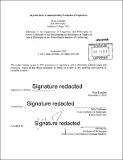Beyond slurs : communicating evaluative perspectives
Author(s)
Lenehan, Rose (Rose Elizabeth)
DownloadFull printable version (2.421Mb)
Alternative title
Communicating evaluative perspectives
Other Contributors
Massachusetts Institute of Technology. Department of Linguistics and Philosophy.
Advisor
Sally Haslanger.
Terms of use
Metadata
Show full item recordAbstract
Slurs have recently received a great deal of attention from philosophers of language. They are thought to be special in both their linguistic properties and their rhetorical effects-that is, in both what they mean and what they do. In this paper, drawing on the work of Elisabeth Camp and Rae Langton, I argue that a wide variety of speech shares the interesting features normally imputed to slurs. In using a slur, Camp argues, a speaker signals allegiance to a derogating perspective. He does not indicate merely that he believes a certain proposition; he indicates that certain features of the world are salient for him and that he experiences them as having a particular kind of disvalue. In her work on hate speech, Langton has argued that speech can be successful not only in its appeal to believe something but also in its appeal to feel or desire something. By presupposing that a hearer feels a certain way, a speaker can make it the case that she feels that way. But none of this is specific to slurs and hate speech. Non-evaluative terms can function in just the same way. When a speaker uses the expression "You're skinny" as a compliment, for example, she presupposes a particular evaluative perspective. Because the perspective is communicated as part of the not-at-issue content of her utterance, it is especially difficult for her hearers to object. The perspective can thus become taken for granted in the conversation without having been explicitly proposed or argued for. This kind of utterance doesn't merely change hearers' beliefs; it can also change their conative attitudes. And, like uses of slurs and other thick terms, it can change what we have social permission to say and do.
Description
Thesis: S.M., Massachusetts Institute of Technology, Department of Linguistics and Philosophy, 2015. Cataloged from PDF version of thesis. Includes bibliographical references (pages 41-43).
Date issued
2015Department
Massachusetts Institute of Technology. Department of Linguistics and PhilosophyPublisher
Massachusetts Institute of Technology
Keywords
Linguistics and Philosophy.